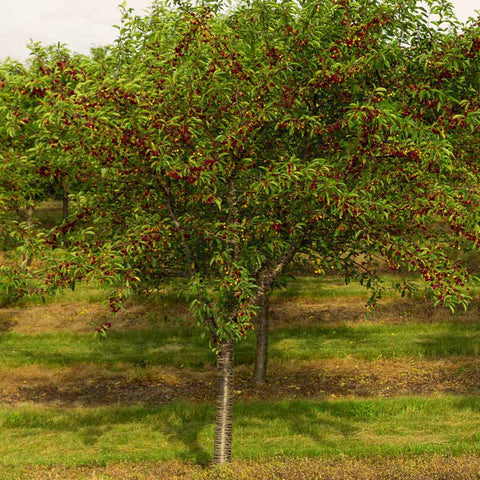Cherry Trees
Showing 21 - 31 of 31 items
Showing 31 of 31 items
Growth Rate: Moderate Growing
Starting at $142.95
Growth Rate: Moderate Growing
Starting at $128.95
Growth Rate: Moderate Growing
Sold Out
Growth Rate: Moderate Growing
Sold Out
Growth Rate: Moderate Growing
Sold Out
Growth Rate: Moderate Growing
Sold Out
Large Variety of Cherry Trees Means Delicious, Fast Fruit.
From a quick, sweet snack right off the tree to the perfect amount of tartness to make a mouthwatering pie, the fruit from our Cherry Trees is second to none. And other than their fresh flavor and healthful benefits, the cherries from our trees are easy to grow.
What Makes Our Cherry Trees the Best?
- Since they’re highly adaptable and ready to acclimate to most climates, our Cherry Trees are a great value and an ideal fit for nearly any landscape.
- We have a unique, wide selection of Cherry Trees, so you’ll be able to find the right tree for your area, which means fresh fruit without any hassle.
- Our Cherry Trees are grafted and grown from mature rootstock, so you’ll get bigger, better results. No need for expensive supermarket trips!
- Easy to plant and maintain, our Cherry Trees make it simple to have your very own backyard orchard.
How to Plant Cherry Trees

Similar to many of our fruit varieties, Cherry Trees are simple to plant and maintain, especially since we’ve grown and cared for them long before they arrive at your door. Basically, planting our Cherry Trees means you’ll get fresh, healthful fruit in the most effortless, cost-effective way.
How to Grow Cherry Trees
-
When to plant a Cherry Tree? Plant your Cherry Trees during late fall or early spring, when the ground has a lot of moisture.
-
Where do Cherry Trees grow best? Keep in mind that Cherry Trees love sun and good air circulation, so they should be planted away from buildings or other trees and in a location that's sunny.
-
How to plant a Cherry Tree? Place your Cherry Tree in a hole big enough to accommodate the entire root ball, pack the soil or backfill the soil tightly. Water your tree thoroughly once it’s established to ensure the best results. It’s that easy!
-
Are Cherry Trees hard to grow? Because we’ve grafted your tree for best results, you can expect consistency and ease from your Cherry Tree. And we’ve worked hard to ensure your Cherry Tree thrives at our nursery and beyond. You’ll get the same great-tasting fruit and no-hassle consistency, season after season. Just be sure to follow our care tips below for best results. With the proper planting and maintenance techniques, your Cherry Trees should stay healthy and thriving!
-
How long does it take to grow a Cherry Tree? Cherry Trees typically take a few years to get fully established, but our Cherry Trees are grafted and grown from mature rootstock, so you can get results faster! Many of our Cherries can fruit the first year. Keep in mind that the exact growth rate will depend on your specific variety, location and climate, and growing conditions.
How to Care for Cherry Trees
Caring for Cherry Trees is simple. Just follow the guidelines below for happy, healthy, and thriving Cherry Trees!
• Pruning: Do I need to prune? Cherry Trees should usually be pruned during dormancy in the winter, but some varieties (such as the Sweet Fruiting Cherry Tree) should be pruned in late summer. Follow specific pruning directions for your tree type.
• Pollination: Do I need two Cherry Trees to get fruit? Most of our Cherry Trees are self-fertile; however, purchasing two or more trees ensures a dramatically-increased crop and more variety, whether your Cherry Tree is self-fertile or needs a pollinator.
• Picking: When do I pick the cherries? Before cherries are ready for harvest, clusters of white or pink blossoms will emerge in the spring. Once fruit emerges, wait to harvest until the fruit is firm and fully colored. Sour cherries will come off the stem when they’re ripe, while sweet cherries must be tasted to determine maturity.














